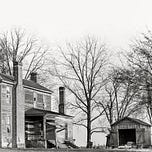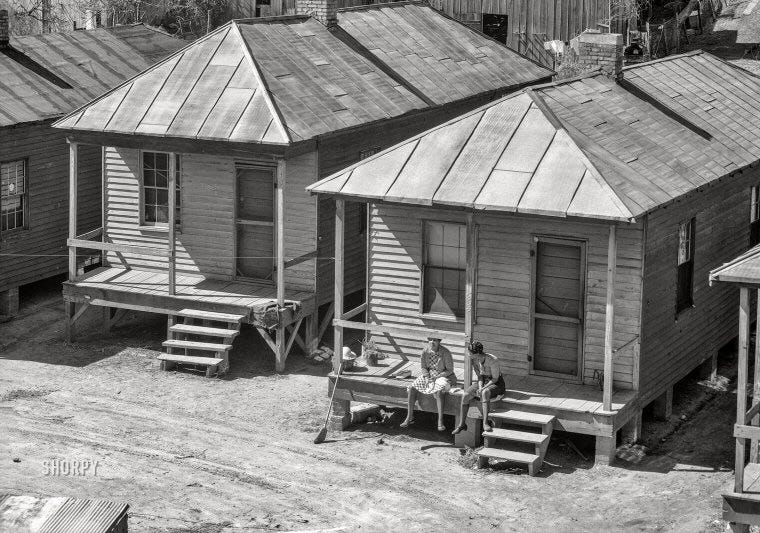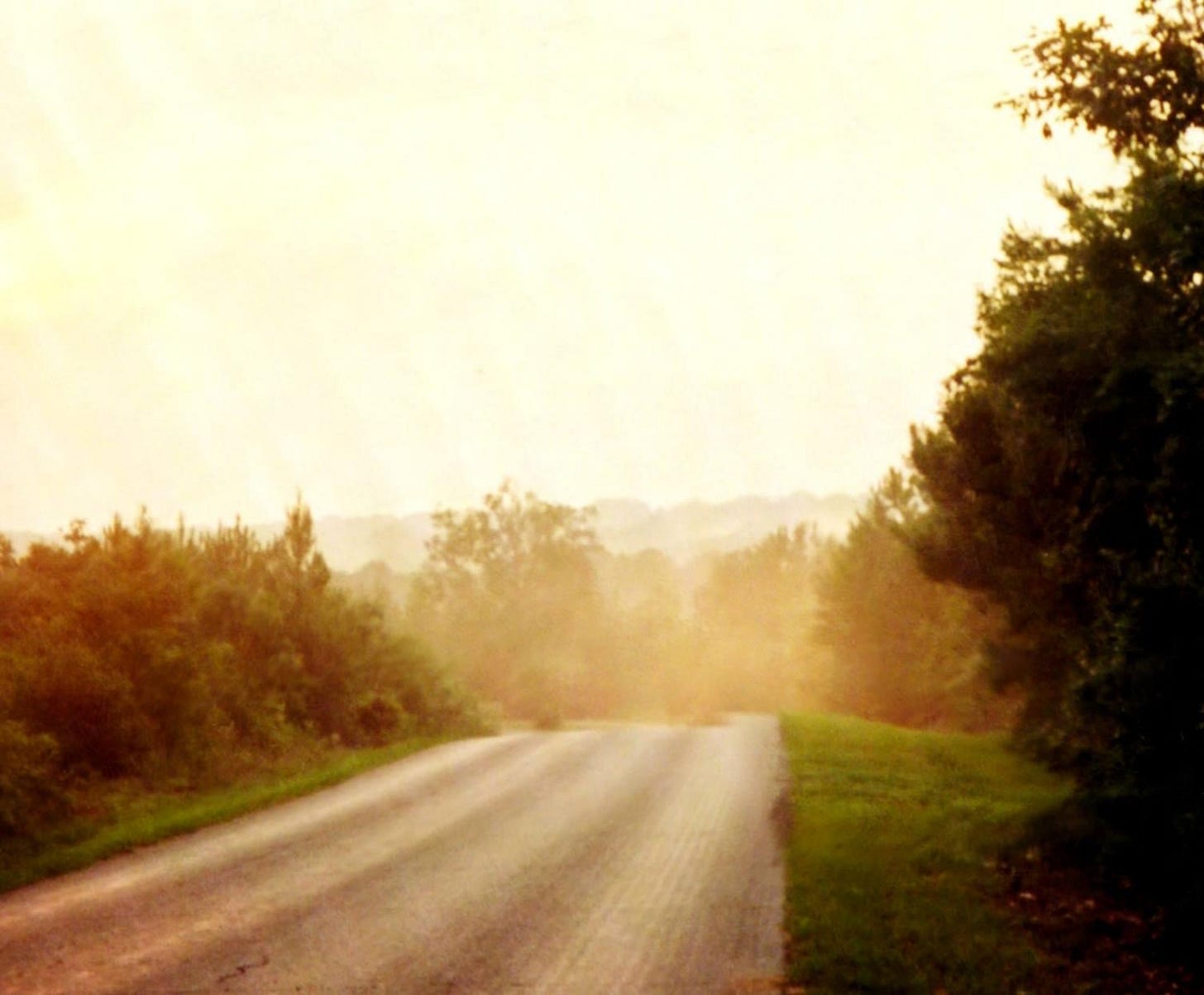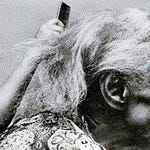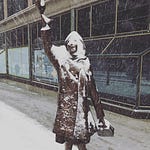This piece marks another departure from the essays and memoirs I’ve shared with you. Periodically, I will be posting chapters from a novel I set aside years ago and have recently begun rewriting. Chapter 1, if you remember, was entitled “Swap Dog Kin” and introduced the characters of Violet and Gran Gran. Chapter 2 introduced David Lee Brackett, an 11-year-old white boy. This is Chapter 3: Shintown, in which David Lee and his mother pay a visit to the colored settlement of Shintown seeking help from the old healer, Gran Gran. From time to time, I hope to share additional chapters, though not necessarily in order. Still, I intend for each to stand on its own as a story worth your time.
By noon, the white boy and his mother had made their way from their house on the edge of the bluffs, past Hardin’s store, and down the loosely graveled road that traced the river for nearly six miles. It was hot. An early morning rain followed by the broiling September sun had laid a sweltering closeness on everything that moved. They walked most of the way. For a short stretch, they’d ridden in the back of a mule-drawn wagon, half filled with snowy cotton, after a colored man stopped to offer them a lift.
The woman was near a stagger when they finally turned off the road onto a rutted track that led to Shintown—a cluster of former slave cabins tucked into a crook of the Hopalachie River.
Populated entirely by colored folks, Shinetown had been set apart from the rest of the county by time and custom. It was over a hundred years old, and many of the cabins had been fixed up and passed down through generations—descendants of the same people who’d once worked the plantation grounds, the ones that hadn’t gone off when Freedom came.
As the strangers descended the hill into the river-bottom settlement, the residents studied them closely. White people, even poor ones, were cause for concern. From their porches or windows, the watchers knew these two had business in Shinetown. No one came by accident. The dirt lane ended at the river, a few hundred yards upstream from the old columned mansion, its hulking ruin trembling closer to collapse with each rain. Occasionally, strangers and gawkers came to scavenge planks of heart cypress or pry up pieces of wrought iron trim. But this woman, pale and swaying on her feet, and the boy, barefoot with a heavy croaker sack slung over his shoulder, didn’t look like scavengers.
.
Most likely, they were seeking out Granada Satterfield, the settlement’s oldest resident. She was known throughout the county as a healer, drawing all sorts, colored and white.
A little further down the track, twelve-year-old Violet Canary was visiting with Miss Ruthie Randolph, having delivered a jar of Palma Christi liniment for the woman’s chronic rheumatism.
“Thank you again, baby,” Miss Ruthie said. I don’t see how Gran Gran could do without you. She's teaching you everything she knows, so you can be the big bug ’round here one day.”
That’s precisely what Violet wanted. Her mother had died when she was five, and she’d come to live with Granada Satterfield, already famous then for her remedies. Gran Gran might brew a tea, make a poultice, or offer a word—and folks came away better. Children were her specialty. Though too old now to catch babies, there wasn’t a childhood affliction she couldn’t tend to, with either a cure or a kindness. Even the colored doctor sometimes sent fretting mothers her way.
Gran Gran turned no one away, regardless of color or what they brought to trade. Miss Clytie, across the way, called all the white ones “low-quality trash” and spat snuff when she said it. But she was wrong. Even Mr. George Hardin, the biggest bug in the county, sent for Gran Gran’s remedies when he needed them.
Before Violet could finish telling Miss Ruthie how her learning was coming along, the woman lifted her gaze out her window. “White folks!” she whispered.
They rushed out to the porch in time to see a gaunt woman in a weary slouch climbing Gran Gran’s steps. Coming up behind her was a pale, bird-boned boy with a tangle of corn-silk hair. Violet guessed there were hens inside for trade from the jostling in his sack.
“She supposed to be resting!” Violet cried.
She dashed across the lane to intercept the visitor before she knocked. Gran Gran was recovering from a bout of pleurisy, and this was her napping time. Violet treated that hour like a soldier on guard duty. White or not, the woman would have to get through her first.
But she was too late. Gran Gran already stood in the doorway, speaking quietly to the woman. The pine-tar poultice Violet had made cast aside.
The boy’s eyes met Violet’s as she approached. Startling blue, fringed with lashes so pale they barely cast a shadow. A clean bandage peeked through his wild hair. That had to be why they’d come. He looked scrawny, like food and him weren’t well acquainted. His mother didn’t look much better.
“Violet,” Gran Gran said, “loose the lady’s hens in the roost out back.”
The boy’s jaw set. His eyes flashed with defiance.
“But Ma,” he protested, “them’s my chickens. I raised ’em, and—”
“David Lee, we talked about this,” his mother said, tiredly. “Give the girl the sack. We’ll get you some more biddies. Be a good boy now. Wait out here till we’re done.”
Violet reached for the sack. After two hard tugs, he let it go.
He followed her around back, dragging his feet as she opened the gate to the sagging wire pen. She set the two dominickers loose among the others. He watched, arms folded tight.
“They got names,” he muttered.
“Who got names?”
He nodded toward the hens. “Salt and Pepper.”
“I’ll remember,” she said. “I don’t forget names. Yours is David Lee. See?” She half expected him to ask hers, but he just looked at her, serious as death.
“They ain’t for eating,” he said. “They for settin’. Talk to ’em nice, and they lay big brown eggs for you.”
She heard the tremble under his bravado. She felt for him, but Gran Gran needed her. “I’ll be sure to tell her that. Salt and Pepper. But I gotta go now.”
Violet left him on the porch and slipped back into the house. She tried catching what the woman had come for but heard a wet, clanking cough, like her lungs were full of rusted nails. Gran Gran’s voice was low, unreadable. Then the old woman shot a glance at Violet, meaning she wasn’t needed here.
Violet was disappointed and stubbornly held her ground. “Take the boy some biscuits,” Gran Gran said firmly.
David Lee was still sitting on the steps, chin in hand, staring across at Miss Clytie, who stood stiff and sour, arms crossed.
“Don’t let her bother you,” Violet said, setting the plate between them. “She don’t like nobody.”
She nudged the biscuits closer to him like she would a wary dog.
“I ain’t scared of her,” he replied without breaking his stare.
That gave Violet pause. Most folks avoided Miss Clytie’s glare. But this boy didn’t flinch. He might not be from Shintown, but he was already earning Violet’s grudging respect. Violet herself was intimidated by the woman.
By sunset, Violet knew Miss Clytie would pull her aside and ask what kind of hoodoo the strangers came looking for. Gran Gran had sworn Violet to secrecy about all her healing work, especially where Miss Clytie was concerned. That woman would carry a bone to anyone who’d listen.
Right now, Miss Clytie knew as much as Violet about what ailed the woman. Maybe she could learn more from the boy.
“What’s wrong with your mama?” she asked gently.
“Just feeling poorly,” he said, eyes still locked on Miss Clytie.
Tight-lipped. A keeper of secrets. Just like her and Gran Gran.
The angry slap of Miss Clytie’s screen door broke the moment. She’d resume her spying from the window now, beaten back by a boy’s stare. That didn’t happen often.
“I know you worried, but maybe Gran Gran can fix her,” Violet said. “Want a biscuit?” Again, inching the plate toward him.
He eyed the plate suspiciously for a long time, but then grabbed one like she might withdraw her offer and gobbled it down.
“She ain’t no real doctor,” he said after a while, crumbs in the corner of his mouth. “Just some old root woman, looks like to me.”
“What you know?” Violet shot back. “She don’t wear no white coat, but she doctors folks just the same. And she’s teaching me everything she knows.”
He turned to her. “Like what?”
“I can fix a headache, if you got one.” She eyed his bandage. “Sure looks like you might. When you get that?”
“Few days ago.”
“Somebody wallop you?”
“Fell, is all. Don’t hurt none. A real doctor fixed it.”
“Too bad.”
He raised a brow.
“I mean, that’s my specialty. Headaches.”
“Sorry I ain’t got one,” he said, sarcastic. He took another biscuit.
The truth was, headaches were about all she could fix so far. That, and digging roots, gathering leaves, and cleaning up after Gran Gran. She’d been so proud to learn that a poultice from the headache tree could ease pain. She tied them around nearly everyone’s head—until half the town looked like they had all been to war.
Gran Gran had laughed. Told her: “When you get in too big a hurry to fix folks, you miss how to heal them.”
Fixing and healing, she said, were not the same.
“To heal someone,” she told her, “you got to look at them like they’re running water, not a sack of rocks. You got to study them from here.” She placed a hand over her chest. “Not from your head. Healing ain’t showing off.”
Violet hadn’t the slightest idea what that meant. Gran Gran never explained things straight. She wound them up in riddles, hid them inside stories. You had to puzzle them out on your own. When the meaning came clear, it was plain as the nose on your face.
She glanced at the boy again. Was she seeing a sack of rocks—or running water?
He was paying her no mind now. That stung. She narrowed her eyes. Maybe he didn’t like colored folk. Still, he hadn’t said no to the biscuits.
Gran Gran always said: “When you look at someone, the first thing you see is yourself. Keep looking.”
So she looked again. The tight brow. The squint. Was it worry for his mother? His father? The chickens? Or something else entirely?
Then Gran Gran and the woman stepped onto the porch, and the boy was on his feet in an instant.
“You alright, Ma?” he asked.
She ran her fingers through his hair. “I’m fine, honey.”
“Violet,” Gran Gran said, “get the lady her chickens. Be right pert. She needs to get back home afore dark.”
Violet hesitated. Hadn’t Gran Gran helped her?
But then she saw Gran Gran’s hand behind her back—three fingers raised.
The woman was dying.
Violet returned with the sack—plus a third hen, one of Gran Gran’s own. It was the only medicine left to give.
Gran Gran sent her to fetch one of Curtis’s boys to bring the mule. “She don’t need to be walking in this heat,” the woman said.
With the sick woman riding Jawbone, Willie Mac leading with a rope, and David Lee trailing alongside, Violet stood in the yard and watched them ascend the track to the big road.
She stood there a long time.
It wasn’t just sadness that settled over her. It was something older, heavier—a wrongness in the world that healing couldn’t always fix.
At the summit of track, the boy turned.
Violet raised her hand. She didn’t wave—just held it still in the air, as if to claim him from afar.
As if to say: You been seen. You been choosed.


